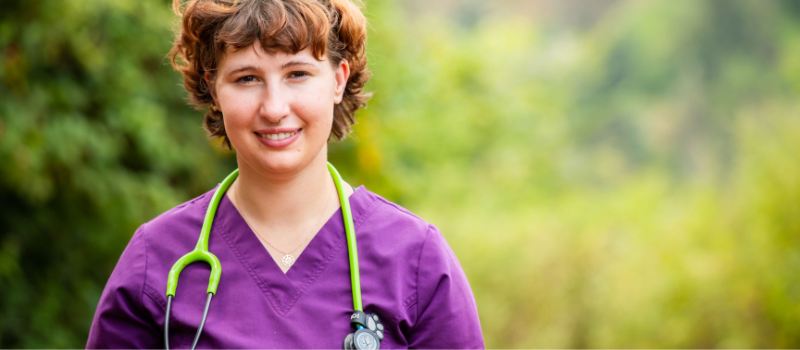#VETSVolunteerVoices brings you inspiring stories from the field, showcasing the impactful work of our dedicated VETS program volunteers. Meet Paige Villeneuve, an Animal Health Advisor who spent three months in rural Kenya (May - August 2024).
Recently, we had the opportunity to speak with Paige Villeneuve about her time in Nyeri County, Kenya where she collaborated with farmers, extension officers, and veterinarians to improve dairy cow management and promote animal health. Her experience not only enhanced the livelihoods of local farming communities but also provided her with invaluable insights into veterinary practices in low-resource settings. Here, Paige reflects on her journey and the lessons she learned as a VETS volunteer.
From Inspiration to Action
Paige’s introduction to the VETS program came through a lunch talk at the Ontario Veterinary College, where she was drawn to the opportunity to combine dairy medicine with community outreach. “This program piqued my interest because it aligned with my academic and professional background while offering a chance to build international connections,” Paige shared. With an Honours Bachelor of Science in Animal Health and hands-on experience on livestock farms, she felt prepared to take on the role of Animal Health Advisor.
Paige explained how her academic foundation and passion for working with livestock made the VETS program a natural fit. “I was particularly excited about the opportunity to work directly with farmers and contribute to improving dairy farming practices. I knew it would be a valuable experience for my future career,” she added.
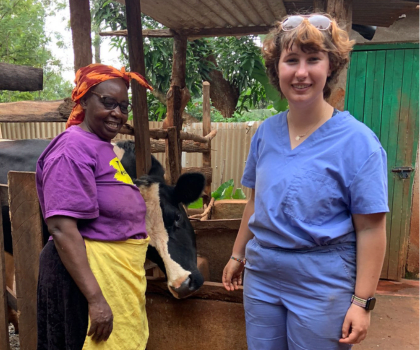 PHOTO: Paige visiting farmer Lillian Muthoni.
PHOTO: Paige visiting farmer Lillian Muthoni.
 PHOTO: Paige Villeneuve.
PHOTO: Paige Villeneuve.
 PHOTO: Paige delivering training to Githakwa farmers.
PHOTO: Paige delivering training to Githakwa farmers.
A Typical Day in Nyeri County
Working closely with the Wakulima Dairy Co-op, Paige’s days began with early-morning drives to farms alongside extension officers. “We’d start by discussing the farmer’s management practices, touring their farm, and offering tailored advice,” she explained. Whether addressing cow comfort or nutrition, Paige and the team provided both personalized consultations and group trainings. These sessions often concluded with tea or a shared meal—moments that solidified bonds between the team and local farmers.
Her day-to-day responsibilities varied but always centered on the goal of equipping farmers with practical, actionable advice. “One of the most rewarding parts was building relationships with farmers. Sitting down for tea after a farm visit wasn’t just a cultural practice—it was a chance to connect on a personal level,” Paige noted.
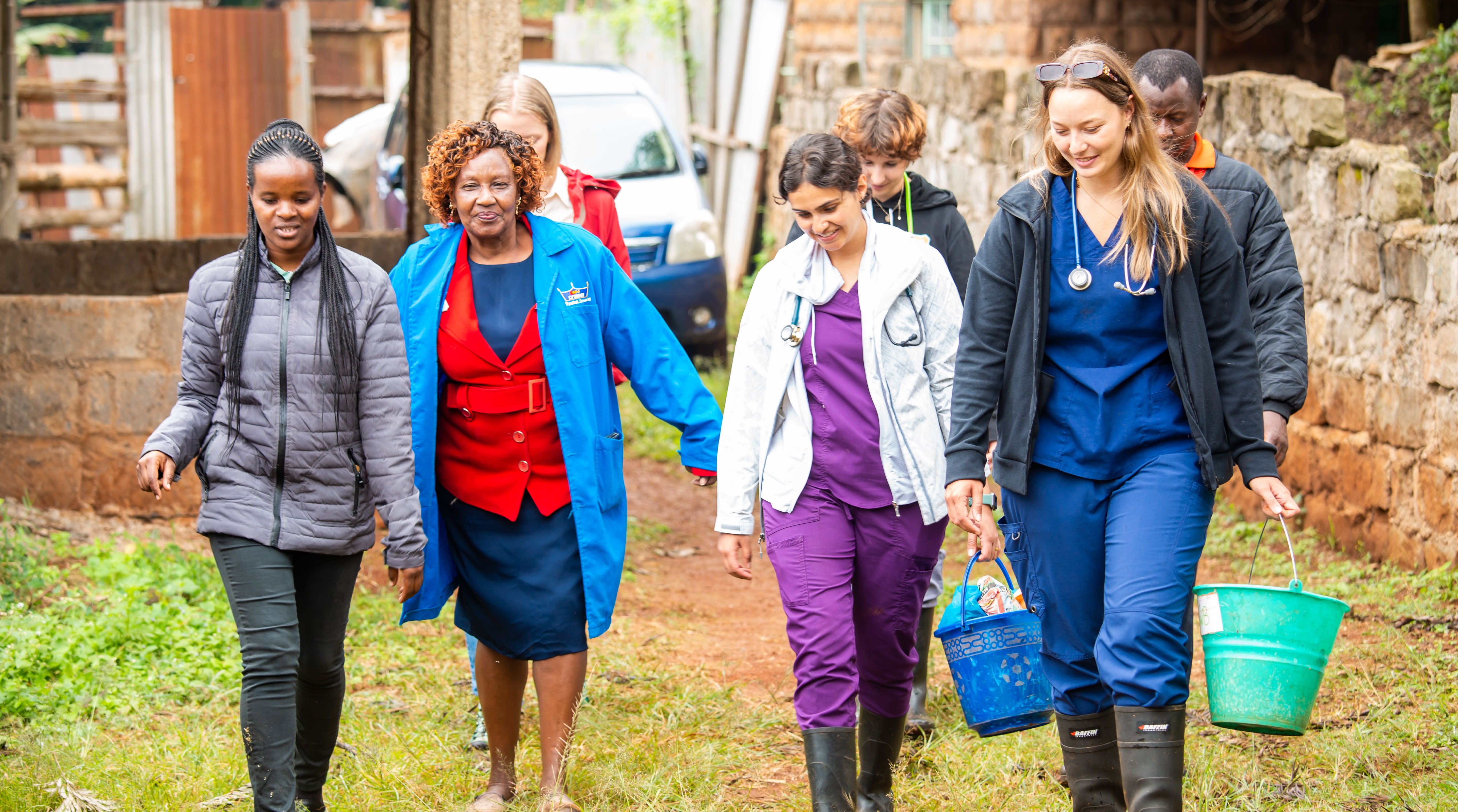 PHOTO: Paige (back row), accompanied by her VETS volunteer colleagues and Wakulima extension officers (front left and back right) arrive at the farm of Lucie Wachira (blue lab coat) in Nduma.
PHOTO: Paige (back row), accompanied by her VETS volunteer colleagues and Wakulima extension officers (front left and back right) arrive at the farm of Lucie Wachira (blue lab coat) in Nduma.
Paige’s collaboration with extension officers was integral to her work. These local experts not only served as translators but also helped adapt technical advice into culturally relevant, actionable steps. For example, instead of providing measurements in liters, they explained water requirements in terms of the number of jerry cans—a familiar unit for local farmers.
Addressing Key Animal Health Challenges
During her placement, Paige encountered common challenges such as mastitis, pneumonia, and Lumpy Skin Disease (LSD). Mastitis, a painful udder infection, was particularly prevalent. Paige and her team emphasized hygiene and milking techniques, teaching farmers to use clean bedding and sanitizers. “We often performed CMT tests to detect infections early, advising farmers to seek veterinary care for affected cows,” Paige noted.
Pneumonia presented another widespread issue, exacerbated by poorly ventilated cowsheds. One of Paige’s most rewarding moments came when she helped a farmer improve ventilation during her first visit. “By removing parts of the shed walls, we created a healthier environment for the cows,” she said. “It was amazing to see how simple changes could have such a big impact.”
Seeing and treating LSD, a disease caused by biting insects, was an eye-opening experience for Paige. “This was something I had only studied in lectures. Witnessing it firsthand deepened my understanding of veterinary challenges in tropical regions.” Paige recalled how local veterinarians taught her to diagnose and treat the disease, providing hands-on learning experiences that complemented her academic knowledge.
Building Local Capacity and Connections
Collaboration with local partners was central to the program’s success. Paige worked closely with Wakulima Dairy staff, including veterinarians, milk quality inspectors, and extension officers. “Extension officers were invaluable,” she said. “Not only did they translate advice into Kiswahili or Kikuyu, but they also provided cultural context to ensure farmers understood and could implement our recommendations.”
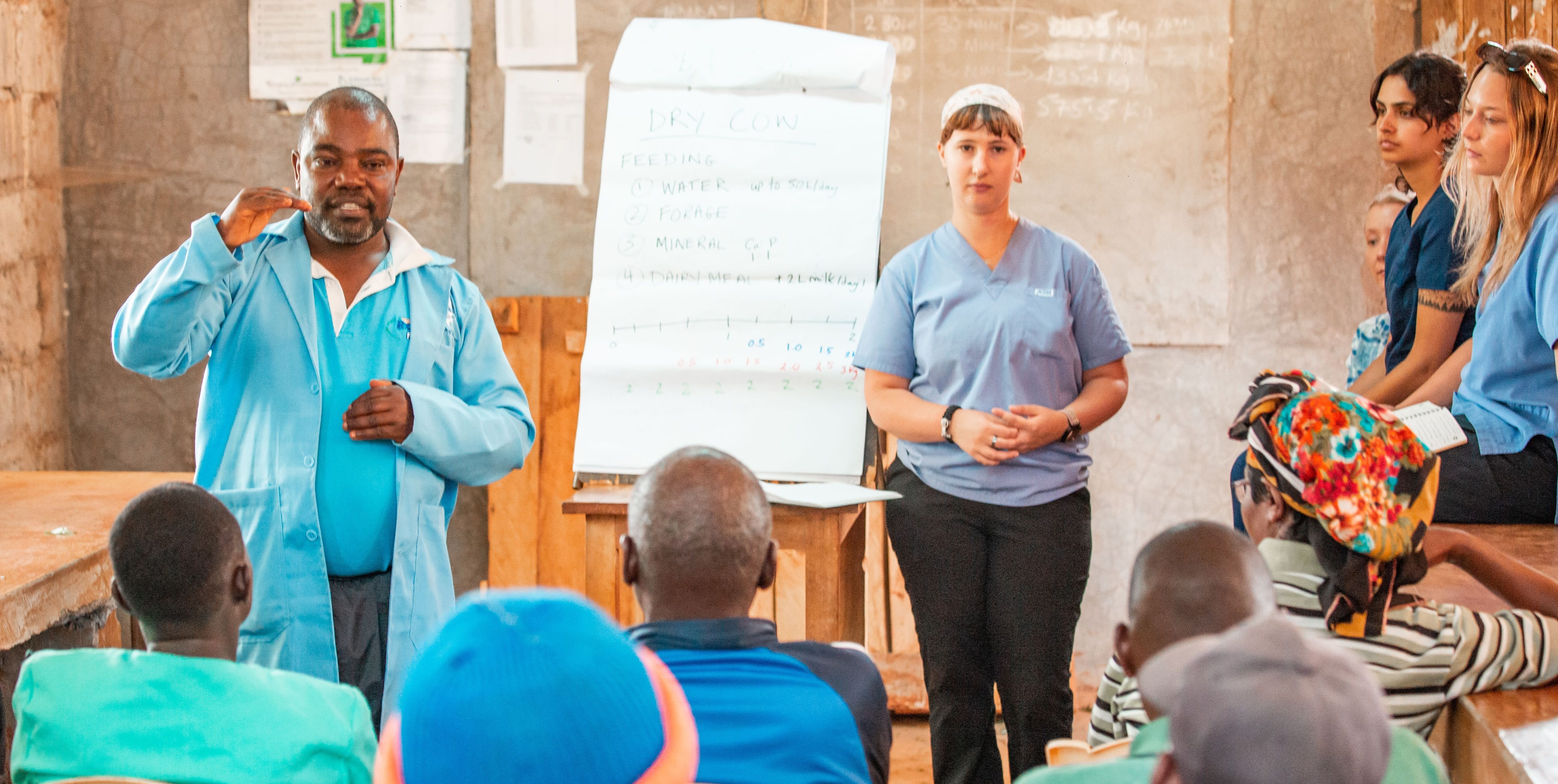 PHOTO: Paige (beside flip chart) delivers "Dry Cow" training to farmers from the Githakwa Farmer’s Group, assisted by Wakulima extension officer, Joseph Kingoni (left, speaking).
PHOTO: Paige (beside flip chart) delivers "Dry Cow" training to farmers from the Githakwa Farmer’s Group, assisted by Wakulima extension officer, Joseph Kingoni (left, speaking).
Paige’s admiration for the veterinarians she worked alongside was evident. “Without the diagnostic tools we take for granted in North America, they were incredibly resourceful and dedicated, finding innovative solutions to complex cases,” she shared.
Paige also emphasized the importance of community-based approaches like the Community One Health Champion (COHC) program. “These champions are farmers trained to educate their peers, multiplying the program’s impact. It’s especially inspiring to see many women taking on these leadership roles.”
Transforming Lives, One Farm at a Time
One memorable success story involved Lillian Muthoni, a farmer whose cow, Rose, struggled with poor resting habits. After Paige’s seminar on cow comfort, Lillian made simple adjustments to her barn that allowed Rose to rest comfortably—a change that will support better milk production in the future. “It was inspiring to see how motivated farmers like Lillian were to implement changes for long-term success,” Paige reflected.
Paige also worked with farmers facing resource constraints. “It was tough to see farmers unable to access certain feed or bedding materials,” she admitted. “But we found creative solutions, like using banana leaves for bedding or planting high-protein crops to supplement feed.” These small but meaningful changes helped farmers overcome challenges while making the most of local resources.
Lessons for the Future
For Paige, the experience in Kenya was as much about learning as it was about teaching. Farmers’ resilience and eagerness to adopt new practices left a lasting impression. “Their dedication to improving their farms, often despite resource limitations, was inspiring,” she said.
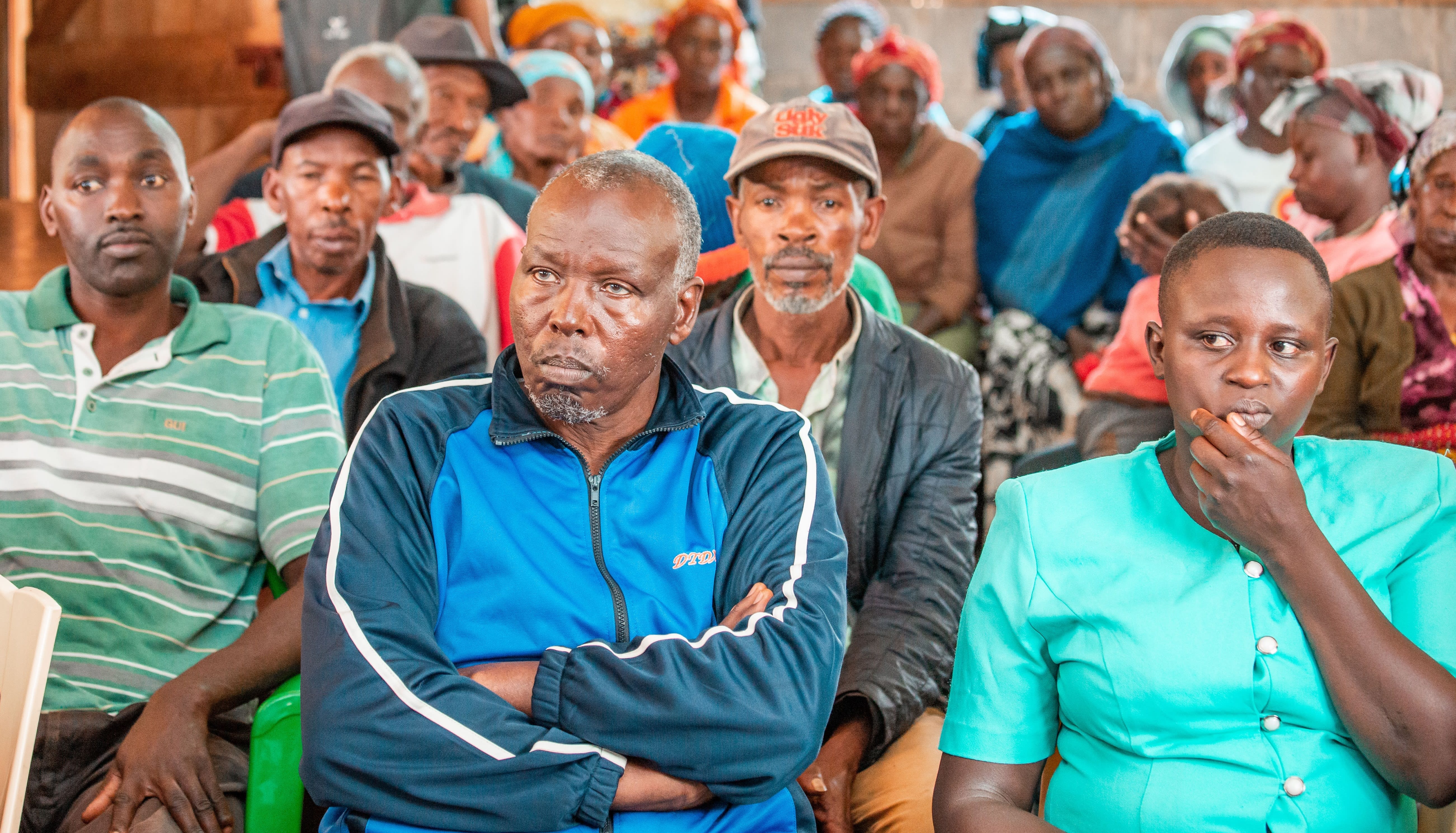 PHOTO: Paige's training in Githakwa was attended by more than 24 farmers, who listened attentively and participated throughout the training.
PHOTO: Paige's training in Githakwa was attended by more than 24 farmers, who listened attentively and participated throughout the training.
Reflecting on her time as a VETS volunteer, Paige noted how the experience reshaped her understanding of veterinary medicine. “It’s easy to assume gold-standard care is universal, but my time in Kenya taught me the importance of adaptability and creativity,” she shared. These lessons will undoubtedly influence her approach as a future veterinarian, particularly in rural or resource-limited settings.
The Strength of the VETS Program
Paige views the VETS program as a model for sustainable development. By partnering with local organizations like Wakulima Dairy, the program bridges technical expertise with grassroots knowledge, ensuring long-term impact. “The strength of VWB’s approach lies in building capacity—empowering farmers, extension officers, and veterinarians to create lasting change,” she said.
For those considering volunteering, Paige has a clear message: “This program offers an incredible opportunity to grow professionally and personally while making a tangible difference. It’s a chance to be part of something bigger—a global community working toward a healthier, more sustainable future.”
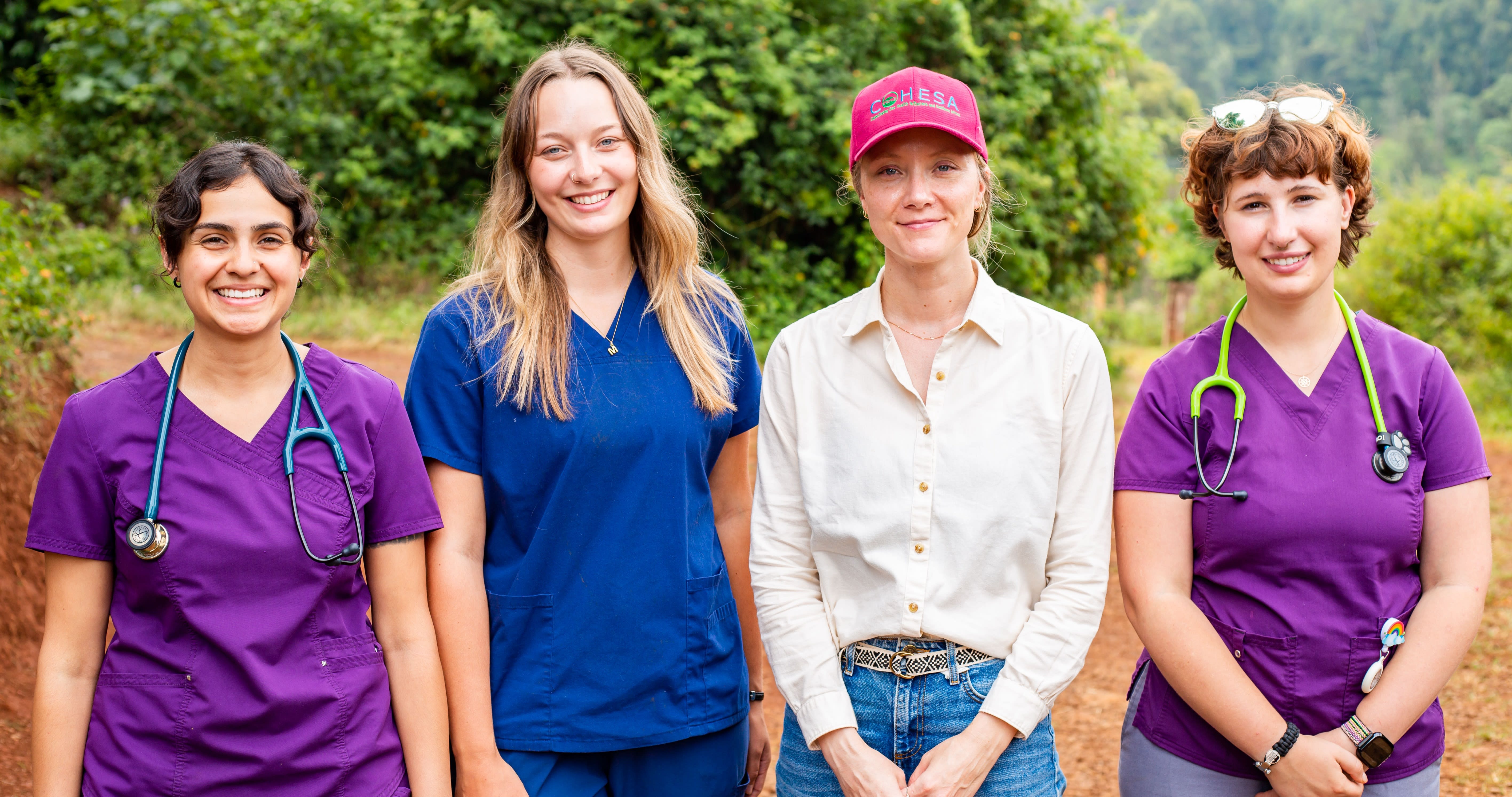 PHOTO: Safira Teja (VETS Volunteer), Madilyn Prive (VETS Volunteer), Shauna Richards (Technical Advisor), and Paige all participated in VWB's Emerging Leaders Program during the summer of 2024.
PHOTO: Safira Teja (VETS Volunteer), Madilyn Prive (VETS Volunteer), Shauna Richards (Technical Advisor), and Paige all participated in VWB's Emerging Leaders Program during the summer of 2024.
VETS is an 8-year initiative (2020-2028) to improve the economic and social well-being of marginalized people, particularly women and girls, in 6 countries across Africa and Asia. In collaboration with local partners, the program is implemented through 190 Canadian volunteers on international assignment and is generously funded by Global Affairs Canada. Learn more.

